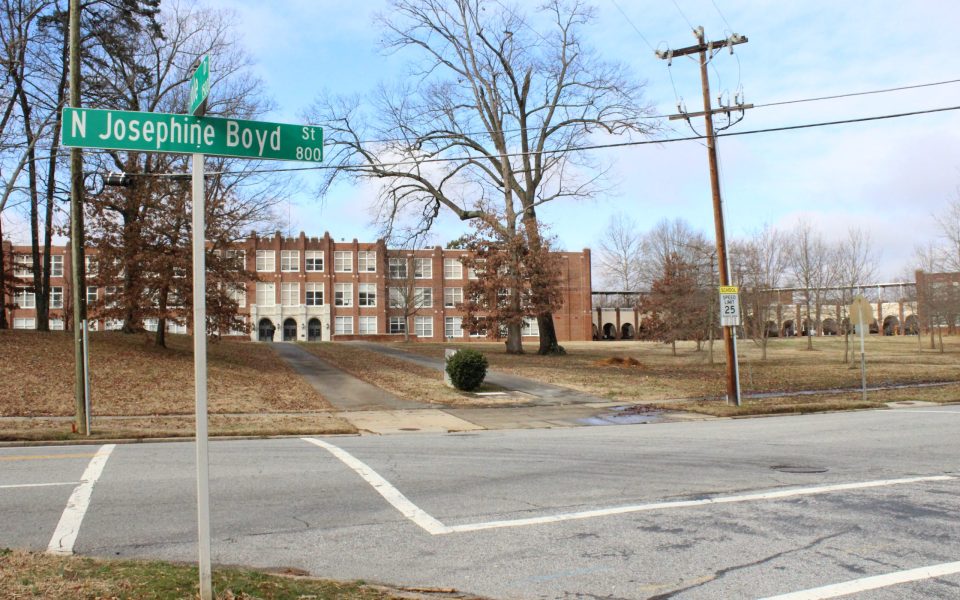In many ways, Jan. 3 was just another Thursday. The weather was unseasonably warm with a light drizzle in the air. The line at Biscuitville spilled out on Battleground Avenue and for students it was the first day back after Christmas break. As they walked begrudgingly back to their classrooms at Grimsley High School, however, one thing was noticeably different.
One by one, city workers carefully replaced the street signs that read “Aycock Street,” named after Charles Brantley Aycock, to Josephine Boyd Street, after civil rights figure Josephine Boyd Bradley, that ran parallel to the school’s campus.
Just two weeks before the National Guard escorted the Little Rock Nine through the doors of their Arkansas high school in September 1957, Bradley became the first black student to integrate a North Carolina high school by transferring to Grimsley from Dudley High School for her senior year. Greensboro Senior High School, as Grimsley was named back then, was closer to her home.
Three years after the passage of the landmark Brown v. Board of Education Supreme Court ruling, which desegregated schools, Bradley became the only black student at Greensboro Senior High School; one in a school of almost 2,000. Throughout the year, Bradley was taunted and terrorized by students who spit insults as well as other things at her and made death threats, according to news reports. Many believe she was the first black student in the state to graduate from an all-white high school. And she did so in the top 10 percent of her class.
After graduating, Bradley earned multiple degrees, including a doctorate in African-American studies from Emory University. She went on to teach African-American history at Clark Atlanta University. She passed away in 2005 at the age of 75.
Josephine Boyd Street, which took over a part of Westover Terrace and all of Aycock Street, now runs from West Wendover Avenue, just past Grimsley, to Florida Street. The street replaced Aycock Street, named after the state’s 50th governor, a vehement white supremacist who actively worked to disenfranchise black Americans during his lifetime.
In a 1904 address given before the Democratic State Convention in Greensboro, Aycock said, “Let us cast away all fear of rivalry with the negro, all apprehension that he shall ever overtake us in the race of life. We are the thoroughbreds and should have no fear of winning the race against a commoner stock. An effort to reduce their public schools would send thousands more of them away from us.”
We’ve kept this man’s legacy alive for all these years, affixing his name to streets, an auditorium on UNCG’s campus, an entire neighborhood and even a middle school until both were changed last year. Knowing the man’s ideology and active role in crafting lasting legislation that kept black students from attending the same schools, drinking out of the same water fountains and stripped voting rights, we have to ask: How could we have let this happen?
A century later, the effects of Aycock’s racism live on through our criminal justice system, the gerrymandering of our voting maps and the way black students continue to be treated in schools. And yet, we mostly ignore how slaves built some of our highest and most “prestigious” academic institutions but weren’t allowed to enroll in them. We don’t talk about the re-segregation of schools going on in our communities or the school-to-prison pipeline that disproportionately affects black and brown students.
Renaming a street sign is just the first step. Honoring those who actively work to dismantle decades and centuries of racism, people like Bradley, is not only the right thing to do — at this point, it’s absolutely necessary. And we’ve still got work to do.
Join the First Amendment Society, a membership that goes directly to funding TCB‘s newsroom.
We believe that reporting can save the world.
The TCB First Amendment Society recognizes the vital role of a free, unfettered press with a bundling of local experiences designed to build community, and unique engagements with our newsroom that will help you understand, and shape, local journalism’s critical role in uplifting the people in our cities.
All revenue goes directly into the newsroom as reporters’ salaries and freelance commissions.


Thank you for this beautiful article Sayaka. I too, wonder how Aycock’s name could have ever been chosen, and moreover kept for so long. In contrast, the story of Josephine is inspiring.